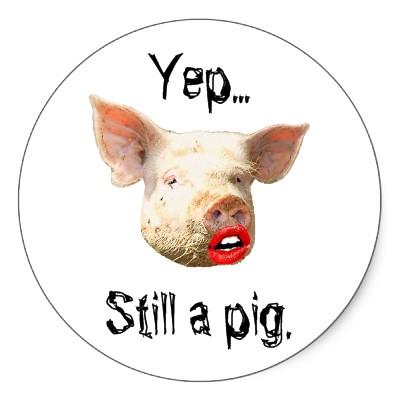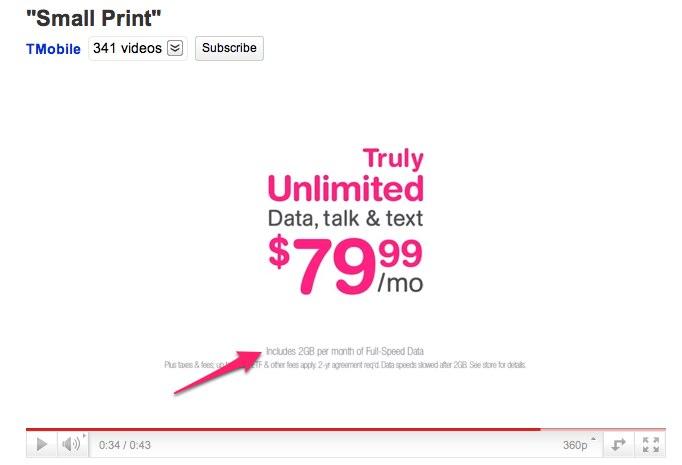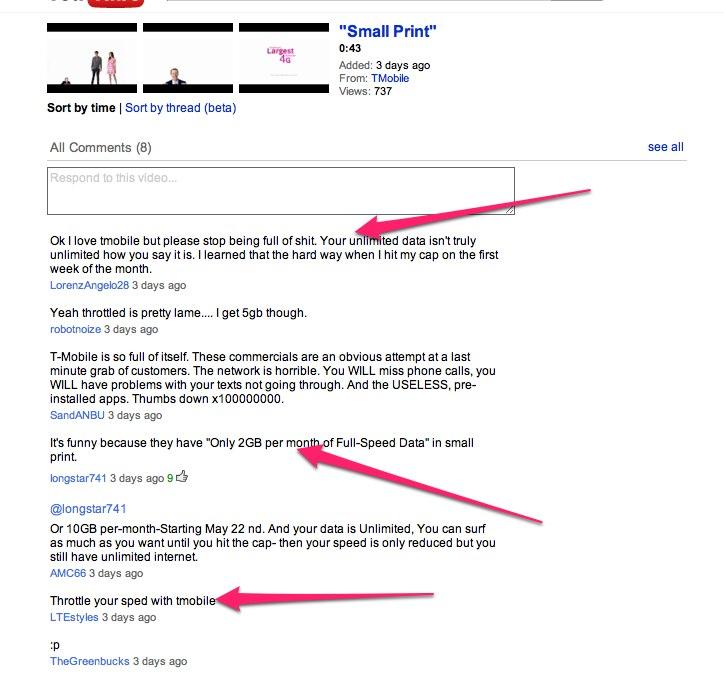Opinion: Why T-Mobile’s “Unlimited Data” Plan Is A Play On Words
I’ve begun a number of my previous editorials with words like “staunch defender, supporter and biggest fan” when it comes to T-Mobile and their corporate decisions. I’ve used those words or something similar in an effort to show that what’s coming up is born out of love and frustration. A storm has been brewing in my eyes as of late with T-Mobile’s recent campaign on “unlimited” data. It came to a head last Thursday evening when T-Mobile’s marketing department posted a video on YouTube (which is now private) depicting Carly and a new character chatting about unlimited data and the “small print” other carriers stipulate. After Carly explained the $79.99 promotional plan as having “unlimited data”, I took issue with T-Mobile’s own fine print at the end of the commercial. The very same “small print” the commercial was designed to poke fun at existed in the exact same nature at the end of the T-Mobile commercial. See below:
As of now, this commercial has been set to private on YouTube and I don’t imagine we’ll see it again. To be blunt, this commercial was ridiculous. A complete sham by T-Mobile to poke fun at other carriers while patting itself on the back for its own terrific value. Except it’s not great value and the company’s definition of “unlimited” isn’t unlimited in any real world sense. Unlimited, according to dictionary.com, is defined as “not limited; unrestricted, unconfined; boundless and most importantly without any qualification or exception”. It is in that last part of the definition that I find fault with T-Mobile’s “unlimited” claim. While I’ll be the first to admit that in a very technical sense T-Mobile’s unlimited plan doesn’t cut you off, In my opinion that’s just a very clever play on words. You can put lipstick on a pig and it’s still a pig. Throttling is a restriction in a very real sense and to claim otherwise is ridiculous and therefore doesn’t quite meet the dictionary definition T-Mobile claims. Are we to understand that wireless carriers are free to interpret words as their marketing departments see fit?
In a blog post that appeared early in the morning the day this YouTube/Twitter debate went down, we posted a breakdown of T-Mobile’s new data plans which included the difference between “high speed” and “reduced speed”. An email sent while using high speed takes 2-6 seconds and reduced speed, or throttling, takes 30-40 seconds. That’s a very noticeable change and one that completely affects the user experience. I can’t imagine users who are used to sending dozens of emails per day using reduced speed for actual work. It’s just not feasible. T-Mobile is misleading its customers with commercials like the one that would have aired. I’m evidently not alone in my thoughts as the few comments that were made about the YouTube video before it was taken down show other individuals were ready to call T-Mobile on the hypocrisy in its advertisement.
The bottom line is that T-Mobile’s claim of unlimited is nothing more than a crafty play on words thanks to a marketing team. “Unlimited” data that reduces speed to the point where it’s all but unusable for anything but the most remedial tasks isn’t unlimited. It’s not without restriction, qualification or expectation. Throttling is very much an exception and a restriction. While throttling may be the T-Mobile way of differentiating itself from the competition along with helping customers avoid overages, it’s also giving them reason to believe it’s actually unlimited. The $79.99 promotional plan reduces data speeds at 2GB’s and that’s unlimited? I’ll go back to the same point that you can put lipstick on a pig but it’s still a pig. This clever play on words is everything that’s wrong with the wireless industry and I fear it will only get worse when AT&T gobbles up T-Mobile.



